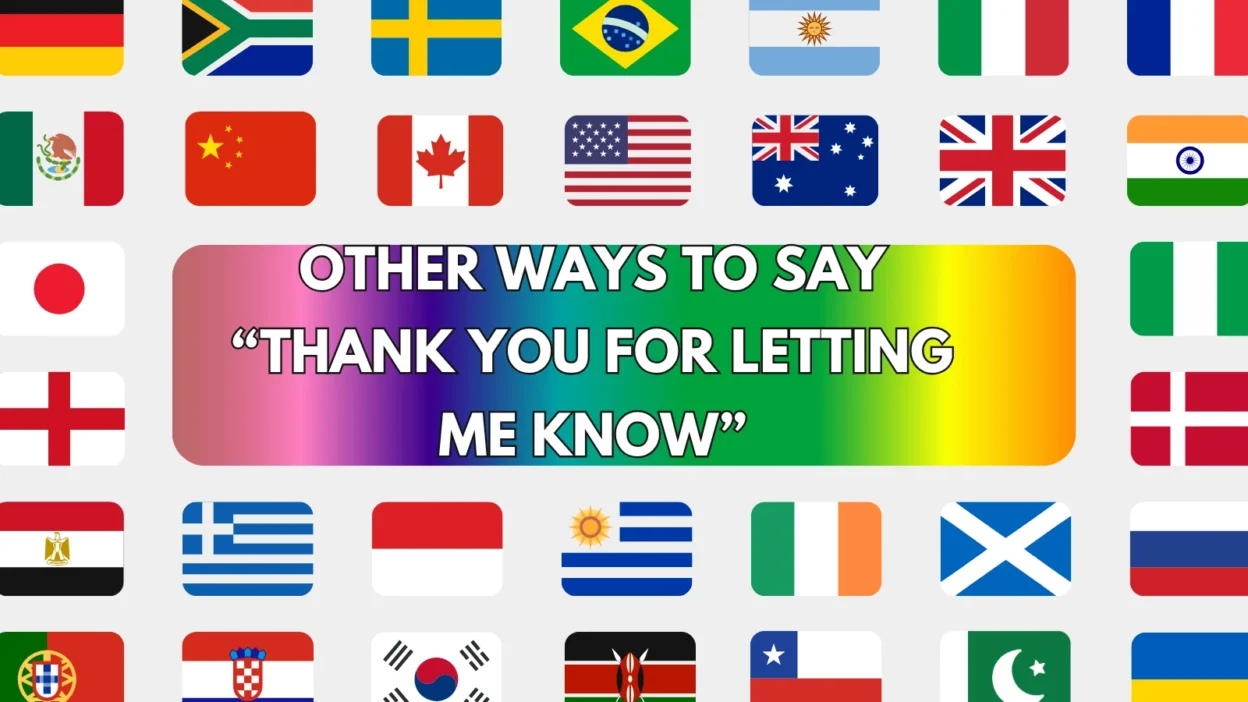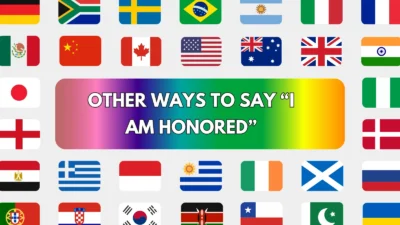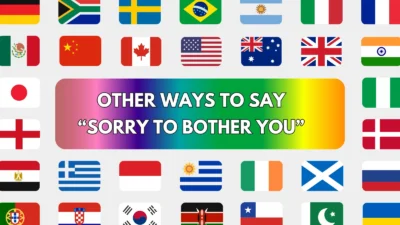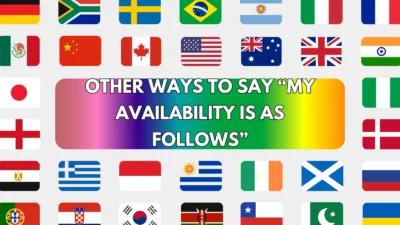The phrase “thank you for letting me know” is polite, professional, and often used to acknowledge information, updates, or feedback. Whether it’s in a business email, a friendly message, or an everyday chat, expressing gratitude in different ways can make your communication feel warmer, more thoughtful, or more natural.
Here are 25 alternative ways to say “thank you for letting me know,” complete with meanings, explanations, examples, and tones to help you find the perfect expression for any situation.
1. Thanks for the update
Meaning: Acknowledges new information shared with you.
Detailed Explanation: A common and professional way to show appreciation for someone keeping you informed.
Scenario Example: Thanks for the update — I’ll make the necessary changes.
Best Use: Work, emails, formal conversations.
Tone: Polite, professional.
2. I appreciate the heads-up
Meaning: Grateful acknowledgment for a warning or early information.
Detailed Explanation: Great for casual or workplace messages where someone gives you timely notice.
Scenario Example: I appreciate the heads-up about the schedule change.
Best Use: Colleagues, friends, teamwork.
Tone: Friendly, appreciative.
3. Thanks for keeping me in the loop
Meaning: Appreciation for being included in ongoing communication.
Detailed Explanation: Shows you value being informed and part of the conversation.
Scenario Example: Thanks for keeping me in the loop on the project’s progress.
Best Use: Team projects, emails.
Tone: Professional, cooperative.
4. I appreciate you telling me
Meaning: Thanks someone directly for sharing information.
Detailed Explanation: A gentle and personal version of the original phrase.
Scenario Example: I appreciate you telling me about the situation.
Best Use: Polite, personal interactions.
Tone: Warm, sincere.
5. Good to know — thank you
Meaning: Acknowledges information with appreciation.
Detailed Explanation: Short, natural, and effective for everyday use.
Scenario Example: Good to know — thank you for the clarification.
Best Use: Texts, chats, quick responses.
Tone: Casual, kind.
6. Thanks for bringing that to my attention
Meaning: Appreciates someone pointing something out.
Detailed Explanation: Often used in professional or corrective contexts.
Scenario Example: Thanks for bringing that to my attention — I’ll fix it right away.
Best Use: Workplaces, management.
Tone: Respectful, professional.
7. I’m grateful for the info
Meaning: Shows appreciation for being informed.
Detailed Explanation: A friendly yet polite phrase for emails or texts.
Scenario Example: I’m grateful for the info — that really helps.
Best Use: Formal or casual use.
Tone: Warm, polite.
8. That’s very helpful, thank you
Meaning: Expresses gratitude while acknowledging usefulness.
Detailed Explanation: Great for when information helps solve a problem or clarify something.
Scenario Example: That’s very helpful, thank you for sharing.
Best Use: Emails, problem-solving talks.
Tone: Appreciative, thoughtful.
9. Thanks for the notice
Meaning: Appreciates a timely alert or reminder.
Detailed Explanation: Short and polite — especially good for schedule or plan changes.
Scenario Example: Thanks for the notice — I’ll adjust my calendar.
Best Use: Work, professional communication.
Tone: Formal, courteous.
10. I appreciate your honesty
Meaning: Acknowledges someone for sharing truthful information.
Detailed Explanation: Good for sensitive updates or honest feedback.
Scenario Example: I appreciate your honesty — it helps me understand the full picture.
Best Use: Personal or work discussions.
Tone: Sincere, respectful.
11. That means a lot — thank you
Meaning: Expresses heartfelt gratitude for being informed or considered.
Detailed Explanation: Adds warmth and emotional value to your response.
Scenario Example: That means a lot — thank you for letting me know early.
Best Use: Personal or appreciative contexts.
Tone: Warm, genuine.
12. I appreciate your quick response
Meaning: Thanks someone for replying or updating promptly.
Detailed Explanation: A perfect email-friendly expression.
Scenario Example: I appreciate your quick response — that helps me plan ahead.
Best Use: Business, emails, formal situations.
Tone: Professional, polite.
13. Thanks for clarifying
Meaning: Appreciates someone clearing up confusion.
Detailed Explanation: Ideal for professional or educational settings.
Scenario Example: Thanks for clarifying — I understand now.
Best Use: Work, discussions, problem-solving.
Tone: Courteous, clear.
14. I’m glad you told me
Meaning: Expresses appreciation and relief about being informed.
Detailed Explanation: Works well for both casual and serious contexts.
Scenario Example: I’m glad you told me — now I can prepare.
Best Use: Friendly or personal use.
Tone: Warm, kind.
15. That’s useful to know
Meaning: Appreciates information that’s practical or relevant.
Detailed Explanation: A mild but genuine acknowledgment.
Scenario Example: That’s useful to know — thanks for sharing.
Best Use: Informal to semi-formal.
Tone: Neutral, appreciative.
16. Thanks for informing me
Meaning: A direct and formal expression of gratitude.
Detailed Explanation: Common in business communication.
Scenario Example: Thanks for informing me of the policy change.
Best Use: Official or formal writing.
Tone: Professional, polite.
17. I appreciate you keeping me posted
Meaning: Thanks for continuous updates or follow-ups.
Detailed Explanation: Best for ongoing projects or communication.
Scenario Example: I appreciate you keeping me posted throughout the process.
Best Use: Workplace, teamwork.
Tone: Polite, friendly.
18. Thanks for the heads-up — I’ll keep that in mind
Meaning: Appreciates advance notice or caution.
Detailed Explanation: Friendly and proactive expression.
Scenario Example: Thanks for the heads-up — I’ll keep that in mind for next time.
Best Use: Work or informal messages.
Tone: Appreciative, conversational.
19. That’s great to hear — thank you
Meaning: Combines acknowledgment with positivity.
Detailed Explanation: Perfect when the news shared is good or encouraging.
Scenario Example: That’s great to hear — thank you for letting me know!
Best Use: Friendly, positive updates.
Tone: Warm, upbeat.
20. Appreciate the follow-up
Meaning: Thanks someone for checking back or updating.
Detailed Explanation: Common in workplace or customer communication.
Scenario Example: Appreciate the follow-up — I’ll review it today.
Best Use: Work emails, client replies.
Tone: Professional, courteous.
21. Thanks for sharing that
Meaning: Appreciates someone for communicating information or news.
Detailed Explanation: Simple and versatile for any setting.
Scenario Example: Thanks for sharing that with me — I didn’t know!
Best Use: Formal or casual.
Tone: Neutral, friendly.
22. I value the update
Meaning: Expresses deeper appreciation for timely or important info.
Detailed Explanation: Works best in professional settings.
Scenario Example: I value the update — it helps me stay aligned with the team.
Best Use: Workplace communication.
Tone: Polite, professional.
23. Thank you for the information
Meaning: Straightforward gratitude for shared details.
Detailed Explanation: Simple and polite — works in all contexts.
Scenario Example: Thank you for the information — I’ll review it shortly.
Best Use: Professional emails or formal writing.
Tone: Neutral, courteous.
24. I’m thankful you told me
Meaning: Adds a personal and emotional touch.
Detailed Explanation: Ideal for sensitive or heartfelt communication.
Scenario Example: I’m thankful you told me — it means a lot to be included.
Best Use: Personal or emotional situations.
Tone: Sincere, caring.
25. That’s kind of you to let me know
Meaning: Thanks someone for being considerate enough to inform you.
Detailed Explanation: Combines gratitude with kindness and warmth.
Scenario Example: That’s kind of you to let me know — I really appreciate it.
Best Use: Polite, friendly exchanges.
Tone: Gracious, warm.
Conclusion
Saying “thank you for letting me know” can be done in countless thoughtful ways. Whether you’re responding to an update, feedback, or a helpful reminder, these 25 alternatives let you adjust your tone — from professional (“Thanks for the update”) to personal (“I’m glad you told me”).
Choosing the right phrase helps your gratitude sound more genuine, polite, and perfectly suited to every situation.

Robat Hood is a creative writer and contributor at Saypadia, focused on explaining trending words, slang, and cultural phrases in a simple and engaging way. With a sharp eye for modern language trends, Robat aims to make Saypadia a trusted place for understanding how words are used online and in daily conversations. His content is informative, approachable, and designed for readers of all levels.




